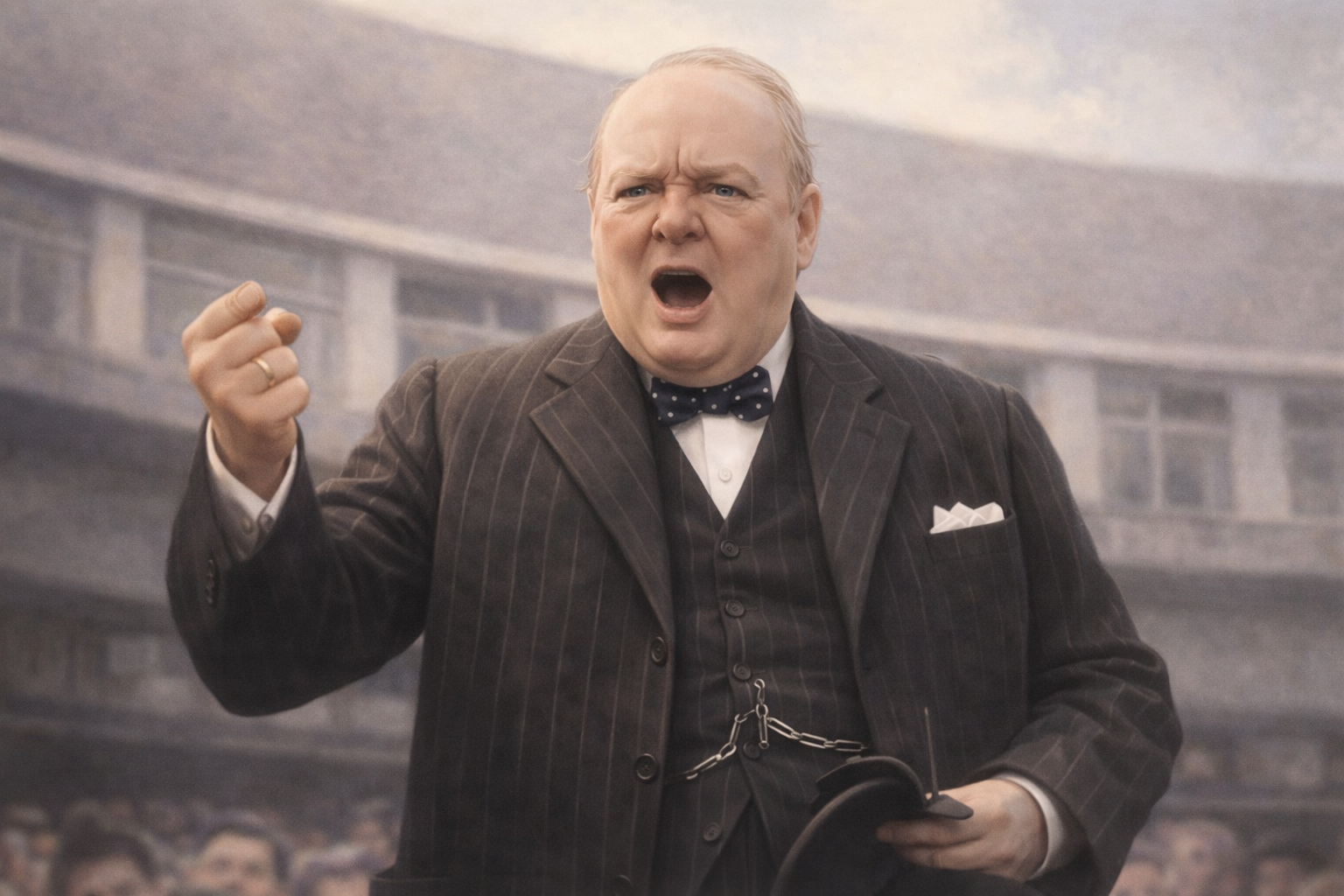Winston Leonard Spencer Churchill was born on November 30, 1874, at Blenheim Palace in Oxfordshire, England. He was the eldest son of Lord Randolph Churchill, a prominent Conservative politician, and Jennie Jerome, an American socialite.
His upbringing was aristocratic yet emotionally distant — his parents were often absent, leaving much of his childhood care to his beloved nanny, Mrs. Everest, whom he called his “dearest and most intimate friend.”
Early Life & Military Service
Churchill was an indifferent student at Harrow and Sandhurst, but he excelled in English and history. Commissioned as a Second Lieutenant in the 4th Hussars, he sought action abroad. He served in Cuba, India’s North-West Frontier, and Sudan — experiences that shaped his worldview and gave him material for his first books.
In 1899, as a young war correspondent in the Second Boer War, he was captured during an ambush. Churchill was captured and imprisoned by the enemy. In a daring escape, he climbed a wall, hid in a coal train, and traveled 300 miles to freedom.
This story made him a national hero in Britain and fueled his early political ambitions. His courage, resourcefulness, and charisma were evident even in youth.
“Nothing in life is so exhilarating as to be shot at without result.”
Entry into Politics & Early Career
Churchill entered politics in 1900 as a Member of Parliament (MP) for the Conservative Party but soon switched to the Liberal Party. He held several government posts, championing social reforms and free trade.
He served as Under-Secretary of State for the Colonies, President of the Board of Trade, and later Home Secretary.
By 1911, he became First Lord of the Admiralty, overseeing naval modernization. He foresaw the coming conflict in Europe and pushed for military readiness.
World War I & Gallipoli
When World War I erupted, Churchill’s naval strategies were critical early on, but his reputation took a severe blow after the disastrous Gallipoli campaign in 1915, which resulted in heavy Allied losses. He resigned and sought redemption by serving on the Western Front as a battalion commander in France.
“Kites rise highest against the wind — not with it.”
Political Isolation & Warning the World
After the war, Churchill rejoined the Conservatives, serving as Chancellor of the Exchequer from 1924–1929. However, the 1930s saw him out of political favor. While others advocated appeasement, Churchill warned tirelessly about the rise of Nazi Germany.
“An appeaser is one who feeds a crocodile—hoping it will eat him last.”
His speeches were often dismissed as alarmist, but history would prove him right.
World War II: Britain’s Bulldog
When war returned in 1939, Churchill was again appointed First Lord of the Admiralty. Following Neville Chamberlain’s resignation in May 1940, Churchill became Prime Minister.
During Britain’s darkest hour in World War II facing Nazi domination of Europe, he rallied Britain with unmatched oratory:
“We shall fight on the beaches, we shall fight on the landing grounds, we shall fight in the fields and in the streets…”
“We shall never surrender!”
That single sentence united a nation. Churchill’s voice became the roar of defiance that kept Britain standing when the rest of Europe had fallen.
During the summer of 1940, German planes bombed British cities relentlessly. Churchill refused to leave London even during the Blitz, visiting bombed areas to encourage the people.
He praised the Royal Air Force with his famous line:
“Never in the field of human conflict was so much owed by so many to so few.”
The story of Churchill standing on rooftops during bombings, watching with binoculars, symbolized his bravery and unshakable spirit.
His leadership during the Battle of Britain and alliance with Roosevelt and Stalin cemented his place in history. He became the symbol of resistance against tyranny.
Post-War Years & the Iron Curtain
In a surprising twist, Churchill lost the 1945 general election, but returned as Prime Minister from 1951–1955. During this period, he sought to strengthen Britain’s global position and famously warned of Soviet expansionism:
“From Stettin in the Baltic to Trieste in the Adriatic, an iron curtain has descended across the Continent.”
Churchill wasn’t just a wartime leader—he was also a brilliant writer and historian. In 1953, he was awarded the Nobel Prize in Literature for his historical writings — a rare honor for a statesman.







Final Years & Legacy
Churchill retired from politics in 1955 but remained a towering figure. His later years were marked by ill health and reflection. He passed away on January 24, 1965, exactly 70 years after the death of his father, and was given a state funeral — an honor rarely granted to a non-royal.
“History will be kind to me, for I intend to write it.”
Legacy in Words and Deeds
Churchill’s life was one of resilience, vision, and unshakable will. He stood firm when the world wavered, and his voice carried hope through the darkest nights of the 20th century. Today, he remains not just a British icon but a universal symbol of courage in the face of overwhelming odds.
Winston Churchill is remembered as a symbol of courage, determination, and leadership. His contributions to defeating fascism and defending democratic values cemented his place as one of the greatest leaders in history.
“Never give in. Never give in. Never, never, never, never—in nothing, great or small, large or petty—never give in, except to convictions of honour and good sense. Never yield to force. Never yield to the apparently overwhelming might of the enemy.”
“If you’re going through hell, keep going.”
“To each, there comes in their lifetime a special moment when they are figuratively tapped on the shoulder and offered the chance to do a very special thing, unique to them and their talents. What a tragedy if that moment finds them unprepared or unqualified for that which could have been their finest hour.”
